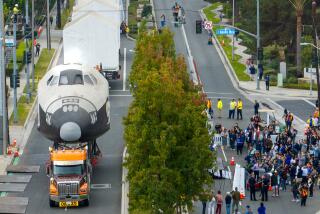Grissom’s Restored Mercury Capsule Is Back Home
- Share via
KENNEDY SPACE CENTER, Fla. — Fished from the Atlantic last summer after 38 years at the bottom of the sea, Gus Grissom’s Liberty Bell 7 space capsule made a dazzling debut Tuesday at the place where it all began.
“Welcome home, Liberty Bell,” Kennedy Space Center’s deputy director, James Jennings, said as the restored Mercury capsule was unveiled.
The space center visitor complex is the first stop of a three-year national tour for the spacecraft that Grissom flew in July 1961.
Sealed in a clear acrylic box for protection, Liberty Bell 7 is displayed so people can peer into the hole where the hatch once was.
Almost everything inside the capsule is original: the rows of switches, bundles of cables, seat straps, folded-up parachute, orange flashlight, red fluorescent light.
The restorers had to put in a new lightbulb. They also had to refashion the handle of Grissom’s control stick; the original, made of aluminum, was corroded away by salt.
Schoolchildren attending the local Space Camp stood on tiptoe to gaze into the 7-foot capsule.
Lowell Grissom, the late astronaut’s brother, said Gus would have been “absolutely, totally amazed” not just by the restoration but also by the recovery.
Liberty Bell 7 sank 300 miles east of Cape Canaveral after a successful 15-minute suborbital flight, the nation’s second manned space shot. The hatch blew off prematurely, and Grissom nearly drowned.
A helicopter tried to pull the capsule from the Atlantic, but the water-filled spacecraft was too heavy and had to be cut loose. Liberty Bell 7 remained at the bottom of the ocean until last July, when a salvage team sponsored by cable television’s Discovery Channel recovered the craft.
Liberty Bell 7 was taken to the Kansas Cosmosphere and Space Center in Hutchinson, Kan., where restorers spent more than six months taking the capsule apart, cleaning it and reassembling it.
The display includes six of the 52 Mercury dimes and one of the five $1 silver certificates that were stashed into the capsule by launch pad workers. Grissom’s autograph is visible on the tattered certificate.
The hatch remains lost in the Atlantic, along with any clues as to why it came off too soon.
Grissom denied until his death in the 1967 Apollo launch pad fire that he did anything wrong, and NASA agreed with him.
But there were rumors that he panicked and wanted out fast. Or that maybe he accidentally detonated the explosives that released the hatch.
“Even if we had found the hatch, I don’t think we could have come to any conclusion,” said the Kansas Cosmosphere’s president, Max Ary. “But still, knowing that’s still out there still maintains that mystery.”
After the tour, the capsule and its contents will be returned to the Kansas Cosmosphere for permanent display.
More to Read
Sign up for Essential California
The most important California stories and recommendations in your inbox every morning.
You may occasionally receive promotional content from the Los Angeles Times.













